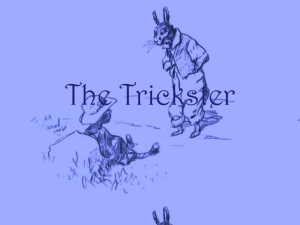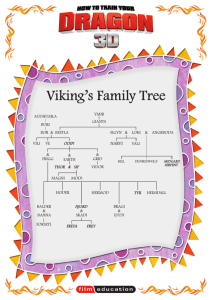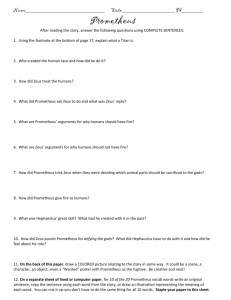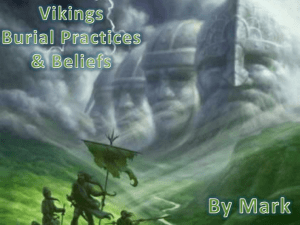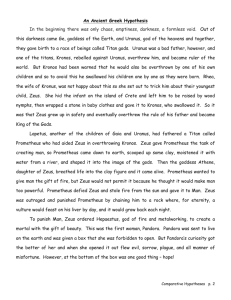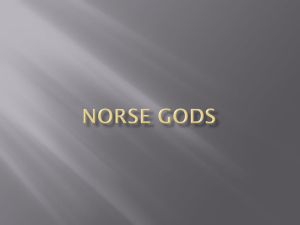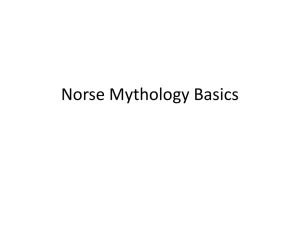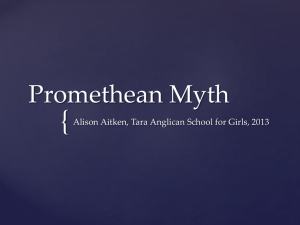Does the story - David Wayne Layman, Ph.D.
advertisement
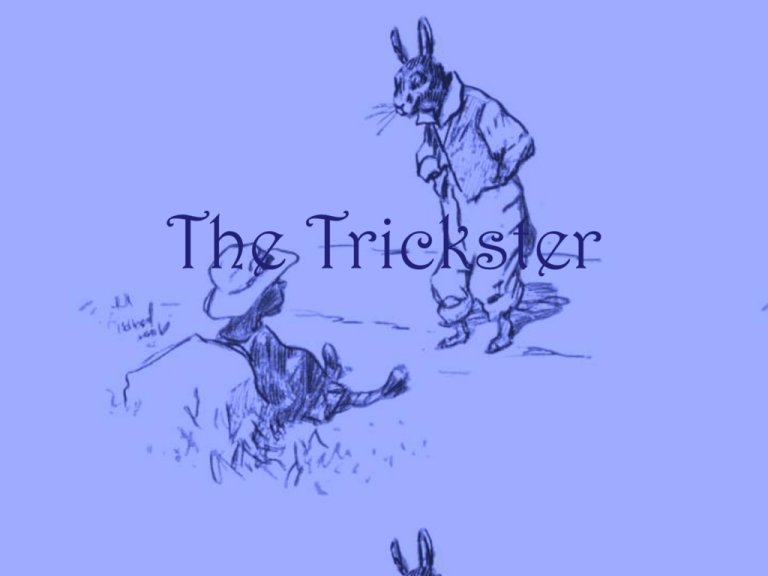
The Trickster Tricksters • • • • • • • May or may not be god-like “liminal”: at the edge, on the border Appetites and reason Morally problematic Greedy manipulator Culture hero Destroy in order to recreate (397) Raven Myth of Sitka: cosmology • “no one knows”; “all sorts of ways” • Creation of light – Needs to get into house where there is light – Impregnates daughter asexually – Keeps crying for objects that contain light – Stars, moon, sun • Exposes light to fishers of “eulachon” Raven Myth at Wrangell: Background and Birth • “only high-caste people knew” • “Nas-ca’kiyel” (“Raven at the head of the Nass”) – To whom…formerly prayed; no one had seen = “deus otiosus” = “idle god” – Discuss other titles • Daughter of unknown origin – No children – Possible quasi-sociological explanation – Eats hot pebble: discuss names Raven: creation of humans • Paratactic description (top and middle) – Humans created twice – Nas-ca’ki-yel is both father and son – Both Raven & Nas-ca’ki-yel want light – Raven gives birth to himself • Humans made from leaves: would you rather be a leaf or rock? Common themes of two Raven stories • Light (“noise” in 2nd version) • Drops water to make bodies of water (377; 379) • Different land and sea animals (377; fuller story 379) – Connection between hunter and hunted • Caught in smoke hole and turned black • Later in the Wrangell account – Fire, witches Why the raven? • 376: “that old manuring raven…” • “crying” for the moon (379), other lights (& 376) • Why are people afraid of light? • Sacralize trickery and embarrassment (377) • What are the characteristics of the raven? • Why are these valued or seen as cultureforming? Eulachon [“OO-li=kan”] • Small migrating fish • Excellent for oil; can be dried and used as candle • Caught at night? African Trickster Tales • “Why the Hare Runs Away”: note problem – Common problem & response of rabbit – The “image” & birdlime: Why does the hare salute the image? • The Ant’s Burden – – – – The dwarf, the sticks, the song What do the big sticks of Anansi represent? Why is the father put in the position of the trickster? What is the moral of the exchange between father and son over the dwarf’s body? – How does the story finally evaluate Anansi? African-American Trickster Tales: “Why They Name the Stories for Anansi” • What trait does Anansi need? • How does the snake defeat Anansi at first? • What character trait of the snake does Anansi use against him? – What does this strategy tell us about being “the wisest and cleverest (390)”? • Does the story approve or disapprove of Anansi? The snake? “Tricking all the kings” • First king: “Massa King” – The well and the tar-baby – What does the story leave out? Why? – Why is the sea better than being shot? What is the trickster always able to do? – What is Buh Nansi’s home? • Second king: the shark – How does Buh Nansi appeal to the shark? – Uses the “small fish” to catch the shark (Buh Nansi “leverages” his catch) “Tricking all the kings” (2): the lion • • • • Why does Buh Nansi invite the lion? What saves Buh Nansi? Does Buh Nansi tell the truth to his wife? The lion tries to become the trickster but lacks the skill • What is the purpose of the dance, baby, & sheet scene? • The peppers and the meal • Does the story really teach the moral it gives us? Prometheus as Trickster • Paratactic – Both bound and freed – Zeus binds and approves release • “Clever Prometheus was bound by Zeus” (l. 1; also see ll. 64-66) • Deceit of sacrifice – Hides meat in stomach and bones under fat – Zeus “chooses” bones – Thus people always burn the bones (l. 46) Crafty Prometheus and angry Zeus • If Zeus “was not deceived,” why does he “rage within” (ll. 39, 43)? • How human existence always is – Zeus’ denial of human needs – “gatherer of clouds” (l. 47); “thunders” (l. 58) – “crafty” [=“cunning”] Prometheus (l. 50) & the “craft” [=“wisdom”] of Zeus (l. 51) – (Denies the fire because of the deception) • See l. 62 (l. 48) Son of Iapetos, cleverest god of all Ἰαπετιονίδη, πάντων πέρι μήδεα εἰδώς, Son of Iapetos of all counsels knows plans, arts So friend, you do not yet forget your (l. 50) crafty tricks ὦ πέπον, οὐκ ἄρα πω δολίης ἐπιλήθεο τέχνης. crafty art, skill, deceitful So spoke the angry Zeus,(l. 51) whose craft is everlasting ὣς φάτο χωόμενος Ζεὺς ἄφθιτα μήδεα εἰδώς: imperishable counsels knows Prometheus in Aeschylus • Discuss the implicit evaluation of Zeus’ rule in ll. 1-21 • List the skills Prometheus claims he gave man. • In what sense is “pro-metheus” the author of these skills? • What does Prometheus’ defense tell us about the nature/efficacy of Zeus’ rule? • What is the “irony” of Prometheus (ll. 53-55)? The skills that Prometheus provides • • • • Reasoning ability, thought, decision, logic Astronomy: navigation, seasons, time & space Mathematics Alphabet: language—remember, keep track of the past, where their going • Calendar (time) • Harnessed animals, sea travel Loki: the Norse Trickster God (pp. 493-4) • Assists the gods in their tricks and machinations • Thor’s “maid” to regain hammer • As mare, draws away the horse of the giant making Asgard – Keeps gods from having to pay the giant • (Snorri) In mare form gives birth to Odin’s steed, Sleipnir • Mocks/insults the gods in Loki’s Quarrel • As Utgard-Loki (?): “sight-deceiving magic” Loki’s Quarrel [=Lokasenna], introduction 1. ‘Tell me, Eldir,… / What the sons of the glorious gods here inside/ Are talking about over their ale’ 2. [Eldir] ‘They discuss their weapons and their prowess in war, … / Among the Aesir and of the elves who are within, / No one has a friendly word for you 3. [Loki]…before the end of the feast quarreling I’ll bring to the Aesir’s son’s / and thus mix their mead with malice.’ The Poetic Edda, Carolyne Larrington, trans. (Oxford Univ. Press) Loki and Idunn 17. ‘Be silent, Idunn, I declare that of all women You’re the most man-crazed, Since you place your arms, washed bright, About your brother’s slayer’ (Idunn) 18. … I quietened Bragi, made talkative with beer; I don’t want you two angry men to fight.’ The Poetic Edda, Carolyne Larrington, trans. (Oxford Univ. Press) Loki and Odin 22. ‘Be silent, Odin, you never know how to / apportion honour in war among men; / Often you’ve given what you shouldn’t have given, / Victory, to the faint-hearted’ [Odin] 23. ‘…yet eight winters you were, beneath the earth, / a woman milking cows, / and there you bore children, / and that I thought the hallmark of a pervert [=“womanish ways,” i.e., effeminate].’ [Loki] 24. ‘But you once practiced seid on Samsey, / and you beat on the drum as witches do, / in the likeness of a wizard you journeyed among mankind, / and that I thought the hallmark of a pervert.’ The Poetic Edda, Carolyne Larrington, trans. (Oxford Univ. Press) Loki and Freyia 30. ‘…of the Aesire and that elves, who are in here, Each one has been your lover.’ [Freyia calls Loki a liar] … 32. ‘Be silent, Freyia, you’re a witch And much imbued with malice, You were astride your brother, all the laughing gods surprised you, And then, Freyia, you farted. [Finally Thor returns, threatens Loki with his hammer, and Loki says he knows Thor means it.] The Poetic Edda, Carolyne Larrington, trans. (Oxford Univ. Press) Loki as source of destruction • Responsibility for Balder’s death may be Snorri’s invention • Bound, under “hot springs” with entrails of son (Völuspa, 33-34) (source of earthquakes) • Ragnarok – Impregnates the giant-woman with the 3 monsters that will destroy the world – Steers ship that brings inhabitants of Muspell Ritual Characteristics of Ritual: Rites of Passage • Rituals that take a person from one state of life to another • Liminal period: “in-between” • Liminal person is socially (=structurally) invisible: may act or play dead • “ritually polluting” • Those sharing the liminal experience are equals Ritual as Play • Life is reconstructed, acted out in new ways • Symbols, designs, masks (≈“dress-up”) – E.g., Kachina masks or dolls (see p. 101) – Communicates beliefs, ideas, enactments through action • This is as much a part of life as “work” – I.e., work and “ritual” are not separate parts of life (see 424-5) (contrast American religion) – One must participate (see 426 bottom) – Liminal periods allow “invention” of “new reality” The “Luminoid” (bottom 424) • Contemporary society is only like a liminal society – Separation of religion and state – Separation of morality and community – Separation of play and work • Contemporary “play” is optional (426) – Levels of cultural sophistication – Irony (satire) as “pseudo-liminal” – “individualized” (427), “plural”(-ism) Demeter and Persephone: the Story (1) • Persephone = Kore (“girl”) – Abducted by Hades (l. 19) – In accordance with will of Zeus – Abduction only viewed by sun and moon • The withdrawal of Demeter – – – – To Eleusis, offers services as old nurse “aw, reverence, pale fear” (190) Iambe and the cup of barley-meal “man must take the gifts of the gods” (216-7, 147-8) Demophoön and Demeter’s Wrath • Demophoön, ambrosia, and cleansing by fire – “immortal…would I have made your son” (ll. 260-1) – “Propitiate my mind” (ll. 274, 292; also ll. 367-9) • Men and gods punished (ll. 310-2) – Give up the dead…lest men die! (ll. 345 ff.) • Return of Persephone – How does death “grab” and “trick” humanity? – “do not nurse unrelenting anger” (ll. 467-8) – The mysteries revealed (ll. 474-482) Outline of the Mysteries (p. 431) • • • • Procession to bring sacred objects to Athens Proclamation Ritual bathing, for purification Procession of initiands to Eleusis – Fasting, ritual bathing – “obscene lyrics” (p. 440, l. 205), for women • “Telesterion” [“completion”]: barley drink, opening of “Anaktoron” Dionysus: basic characteristics (509-11) • “outside” but not an “outsider” • animal passions and vitality – – – – “sap, juice, or lifeblood element in nature” (EB) Ecstasy: ec-stasis: to stand outside Dissolution of boundaries (511) Wine, nature, consumption of raw meat • Myths may not describe actual rituals (511 top) – “Transgressive;” “subversive” – Carried out by city officials, people of high status Major Characteristics of the Myth of Dionysus • Semele wants proof of divine love, dies • Madness – Step-parents, kill children – Dionysos himself – Lycourgos (514), Theban women, Pentheus – pirates • “Insult[ed] and expell[ed] (why?) • “shown…he was a god”; “men came to know he was a god” Major Characteristics of Dionysian Rituals =Orgia (512) • Drinking parties & competitions, drunkenness • Obscenity, cursing, phallic images, crossdressing • The dead walk among us – “Pitchers” and “Pots” • Torchlight processions • Dramas (“City Dionysia”), retelling of myths • “wild cries that combined grief and joy” Phallic Image Norse Gods and Norse Rituals: Odin • “lord of hosts” – Fills Valhalla with warriors – Both gives and withdraws his favor (481) – “stirs up warfare” (482) • The self-dedication of Odin (also see 491) – Hanging and spearing • Norse replacement of Germanic “Tiwaz” = “Tyr” • Valkyries: “ravens,” hanging over the battlefield • Beserkers: the madness of battle (485) Havamal: the self-sacrifice of Odin 138 Wounded I hung on a wind-swept gallows For nine long nights, Pierced by a spear, pledged to Odhinn, Offered, myself to myself The wisest know not from whence spring The roots of that ancient rood 139 They gave me no bread, They gave me no mead, I looked down; with a loud cry I took up runes; from that tree I fell. http://vta.gamall-steinn.org/havamal.htm Havamal: Odin gains power and wisdom 140 Nine lays of power I learned from the famous Bolthor, … 141 Waxed and throve well; Word from word gave words to me, Deed from deed gave deeds to me, 142 Runes you will find, and readable staves, Very strong staves, Very stout staves, Staves that Bolthor stained, Made by mighty powers, Graven by the prophetic god, http://vta.gamall-steinn.org/havamal.htm Funeral Human Sacrifice (Ahmad Ibn-Fadlan) (a servant girl volunteers to “join” her dead master) “They gave her strong drink and admonished her to drink it quickly. After this, the girl seemed dazed. At this moment the men began to beat upon their shields, in order to drown out the noise of her cries, which might deter other girls from seeking death with their masters in the future. They laid her down and seized her hands and feet. The old woman known as the Angel of Death knotted a rope around her neck and handed the ends to two men to pull. Then with a broad dagger she stabbed her between the ribs while the men strangled her.” http://www.sammustafa.com/Resources/Fadlan.pdf “Tollund Man” Tollund man 2 From Njals Saga (quoted in Gods and Myths of Northern Europe, Kindle Location 1104-1111) We weave, we weave the web of the spear, as on goes the standard of the brave. We shall not let him lose his life; the Valkyries have power to choose the slain. … All is sinister now to see, a cloud of blood moves over the sky, the air is red with the blood of men, as the battle-women chant their song. Norse Gods and Ritual: Thor • Physical vitality and strength – Easily angered – Huge appetite – “Son of the earth” • Thor’s hammer – Required against the giants: Thrym’s Poem – “sign of the hammer”: birth, and maybe death – See 487, middle: swastika Day soon became evening, and ale was brought to the giants' table. There Thor ate an ox and eight whole salmons,… [and] drank three measures of mead. Thrym, the lord of giants, said, "Have you ever seen a bride eat and drink so heartily?” The maid-servant wisely answered thus: "Freyja was so eager to come to Jotunheim that she has eaten nothing for eight nights.” Thrym stooped beneath his bride's veil, wanting to kiss her, then jumped back the whole length of the hall. "Why are Freyja's eyes so fearful?" he said. "I think that fire is flaming from her eyes.” …"Freyja …has not slept for eight nights.” http://www.pitt.edu/~dash/thrym.html Then a poor sister of one of the giants came in and dared to beg a gift from the bride. "If you want my love and friendship then give me the gold rings from your fingers," she said. Then Thrym, the lord of giants, said, "Bring me the hammer to bless the bride. Lay Mjöllnir on the maiden's lap, let the two of us thus be hallowed in the name of Vor, goddess of vows!” When Thor saw the hammer his heart laughed within him, and he took courage. He first slew Thrym, the lord of giants,…. Finally he slew the old giantess …. Instead of rings she received the mark of Mjöllnir. Thus Thor won back his hammer. http://www.pitt.edu/~dash/thrym.html Fertility Gods • Freyr – Human sacrifice – Dancing (sexually suggestive/cross-dressing?) – “make love not war” (488) • Freyja (sister-spouse of Freyr) – Fertility goddess ≈ Aphrodite, Ishtar – Volva (female shaman, see 489-90) Norse Shamanism • Volva: the female shaman – Seidr: “witchcraft” (?) – Incantation and ecstatic states – Bird-form: fly over the land • Odin as shaman – Link between worlds – The “world-tree” (=Yggdrasil) – The head of Mimir Death Rituals • Death as a journey – Ship – (Lord of the Rings: last ship to the west) • Thor’s hammer/swastika on urns/stones • Mound, the “holy hill” (492) • Odin, war, cremation
